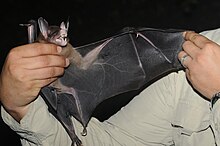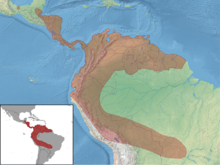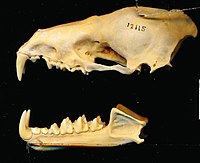美洲假吸血蝠
外观
| 美洲假吸血蝠 | |
|---|---|

| |
| 头部特写 | |

| |
| 科学分类 | |
| 界: | 动物界 Animalia |
| 门: | 脊索动物门 Chordata |
| 纲: | 哺乳纲 Mammalia |
| 目: | 翼手目 Chiroptera |
| 科: | 叶口蝠科 Phyllostomidae |
| 属: | 美洲假吸血蝠属 Vampyrum Rafinesque, 1815 |
| 种: | 美洲假吸血蝠 V. spectrum
|
| 二名法 | |
| Vampyrum spectrum | |

| |
| 异名 | |
| |
美洲假吸血蝠(学名:Vampyrum spectrum),属哺乳纲翼手目叶口蝠科,也是美洲假吸血蝠属的唯一物种,栖息于墨西哥、中美洲及南美洲。其同科近亲有窄齿长舌蝠属(窄齿长舌蝠)、缨唇蝠属(缨唇蝠)、圆耳蝠属(圆耳蝠)等之数种。
美洲假吸血蝠为新大陆上最大型的蝙蝠,同时也是最大型的肉食性蝙蝠,翼展可达 0.7—1.0米(2.3—3.3英尺)。具有粗壮的头颅与牙齿,可以透过强大的咬合力杀死猎物,多半以鸟类、啮齿类、昆虫或其他蝙蝠为食。
和其他大部分的蝙蝠不同,美洲假吸血蝠为单配偶制,群体由一头成年雄性与一头成年雌性及它们的后代所组成,雄性负责将食物带回巢穴喂养群体,多半位于树洞之中。由于数量稀少加上栖息地破坏的威胁,美洲假吸血蝠已被国际自然保护联盟标为近危物种。
描述
[编辑]美洲假吸血蝠为新大陆上最大型的蝙蝠,同时也是世界上最大行的肉食性蝙蝠[3]。翼展可达 0.7—1.0米(2.3—3.3英尺)[4] ,前臂长度为 101—110 mm(4.0—4.3英寸)[5],拇指长 21.4—22.2 mm(0.84—0.87英寸)[6],上面具有类似猫的弯曲利爪[4]。全身体长可达 135—147 mm(5.3—5.8英寸),体重约为 134—189 g(4.7—6.7 oz)[7][6]。
总体来说,美洲假吸血蝠的头颅骨类似于缩小版的犬科或熊科头颅骨[8]
美洲假吸血蝠的脑相对于身体来说偏大(1:67),其脑部身体质量比甚至较猫狗还高[9][10]。
参考文献
[编辑]- ^ Aguirre, L., Mantilla, H., Miller, B. & Dávalos, L. Vampyrum spectrum. The IUCN Red List of Threatened Species 2008. [13 September 2012].
- ^ Linnæus, Carl. Systema naturæ per regna tria naturæ, secundum classes, ordines, genera, species, cum characteribus, differentiis, synonymis, locis. Tomus I [By means of the three kingdoms of nature, the nature of the system, according to the classes, ordines, genera, species, with the characters, the differences, synonyms, places.] 10th. Holmiæ: Laurentius Salvius. 1758: 31 [21 November 2012]. (原始内容存档于2012-11-08) (拉丁语).
- ^ Nuwer, Rachel. The World’s Carnivorous Bats Are Emerging From the Dark. Smithsonian.com. Smithsonian Institution. 10 May 2016 [17 July 2017]. (原始内容存档于2018-07-18).
- ^ Gardner, A. L. Mammals of South America, Volume 1: Marsupials, Xenarthrans, Shrews, and Bats 1. University of Chicago Press. 2008: 299–300. ISBN 978-0226282428.
- ^ 6.0 6.1 da Silva, A. P.; Rossi, R. V. New records of Vampyrum spectrum (Chiroptera, Phyllostomidae) for the Pantanal domain in Brazil, with notes on the species natural history, biometry, and lower incisors arrangement. Chiroptera Neotropical. 2011, 17 (1): 836–841.
- ^ Simmons, N. B.; Voss, R. S. The mammals of Paracou, French Guiana, a Neotropical lowland rainforest fauna. Part 1, Bats. Bulletin of the AMNH. 1998, (237) [2019-01-08]. (原始内容存档于2019-01-11).
- ^ Santana, Sharlene E; Cheung, Elena. Go big or go fish: Morphological specializations in carnivorous bats. Proceedings of the Royal Society B: Biological Sciences. 2016, 283 (1830): 20160615. PMC 4874722
 . PMID 27170718. doi:10.1098/rspb.2016.0615.
. PMID 27170718. doi:10.1098/rspb.2016.0615.
- ^ Bhatnagar, Kunwar P; Smith, Timothy D; Rai, Shesh N; Frahm, Heiko D. The Chiropteran Brain Database: Volumetric Survey of the Hypophysis in 165 Species. The Anatomical Record. 2016, 299 (4): 492–510. PMID 26800031. doi:10.1002/ar.23321.
- ^ Measuring Brain Size versus Body Size. Serendip Studio. Serendip. [24 July 2018]. (原始内容存档于2018-10-19).



